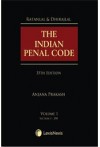- Author(s): Ratanlal, Dhirajlal, Anjana Prakash
- Publisher: LexisNexis
- Edition: 35 Ed Rp 2022
- ISBN 13 9789391211196
- Approx. Pages 3246 + Contents
- Format Hardbound
- Approx. Product Size 24 x 18 cms
- Delivery Time 3-5 working days (within Kerala & South India) (Others 7-9 days)
- Shipping Charge Extra (see Shopping Cart)
.............................................................................................................................
Description
Over the years, the provisions of the Indian Penal Code have been the subject of a plethora of judicial interpretations. Earlier editions of this well-known work have presented many such interpretations. This, the 33rd Edition, endeavours to analyse the current judicial as well as legislative issues connected with the Indian Penal Code. It is a stark fact that massive amount of case law has swelled up over the years which crammed the law journals ever since the Code came into force. Nevertheless, the basic features of penal law envisaged in the original text remained undisturbed. The changes made in the Code during early years were few and far between, but those amendments made by the Parliament during the last thirty years brought major advancements covering larger fields of criminal activities.
Offences relating to cruelty to women are the main innovations brought about during the past few decades. The new offences mentioned in the Code reflected the anxiety of the Parliament about the well-being of the Indian women and the indignities and abuses suffered by many brides in their marital homes. In essence, Sections 304-B and 498-A, creating the offences of 'Dowry death' and 'cruelty to women' are the musings of societal concern for gender justice. Parliament showed legislative diplomacy and skill when it invigorated a hitherto somnolent provision like Section 306 IPC on 'abetment of suicide' by intertwining it with a new provision in the Indian Evidence Act (Section 113-A), introducing a new factual presumption. By a legal fiction it created a practical dragnet to catch those who are really responsible for the suicide of married women within the span of seven years from the marriage. Even during the earlier years after the Penal Code became law in India the subtle nuances of distinction between 'culpable homicide' and 'murder' delineated therein instilled a sense of circumspection in the minds of judges. Through a catena of judicial expositions the seemingly intricate areas were unfurled when deciding which of the two offences was relevant on the facts of a particular case. Thus, judicial pronouncements helped to identify the real differences for practical application of the provisions. However, recently a two-Judge Bench of the Supreme Court in Sher Singh @ Partapa v. State of Haryanawhile dealing with Section 304B IPC and Section 113B Evidence Act, inter alia, held as follows:
(a) Prosecution can discharge the initial burden to prove the ingredients of S. 304B even by
preponderance of probabilities.
(b) Once the presence of the concomitants are established or shown or proved by the prosecution,
even by preponderance of possibility, the initial presumption of innocence is replaced by an
assumption of guilt of the accused, thereupon transferring the heavy burden of proof upon
him and requiring him to produce evidence dislodging his guilt, beyond reasonable doubt."
But too many judicial precedents unequivocally held that in order to establish the offence of dowry death under Section 304B, IPC the prosecution has to prove beyond reasonable doubt that the husband or his relative has subjected the deceased to cruelty or harassment in connection with demand of dowry soon before her death. It is also well settled that when an accused has to rebut the presumption, the standard of proof for doing so is that of 'preponderance of probabilities.
Even in a case where the statute (Section 35 NDPS Act) requires the accused to prove his case beyond reasonable doubt, a three-judge Bench of the Apex Court in Abdul Rashid v. State of Gujarat had read it down in the following manner, presumably to save the provision from the vires of Article 21 of the Constitution
.............................................................................................................................
Contents
Volume I
I. Introduction
II. General Explanations
III. Of Punishments
IV. General Exceptions
V. Of Abetment
V-A. Criminal Conspiracy
VI. Of Offences against the State
VII. Of Offences Relating to the Army, Navy and Air Force
VIII. Of Offences against the Public Tranquility
IX. Of Offences by or Relating to Public Servants
IX- A. Of Offences Relating to Elections
X. Of Contempts of the Lawful Authority of Public Servants
XI. Of False Evidence and Offences against Public Justice
XII. Of Offences Relating to Coin and Government Stamps
XIII. Of Offences Relating to Weights and Measures
XIV. Of Offences Affecting the Public Health, Safety, Convenience, Decency and Morals
XV. Of Offences Relating to Religion
Volume II
XVI. Of Offences Affecting the Human Body.
XVII. Of Offences against Property
XVIII. Of Offences Relating to Documents and to Property Marks
XIX. Of The Criminal Breach of Contracts of Service
XX. Of Offences Relating to Marriage
XX-A. Of Cruelty by Husband or Relatives of Husband
XXI. Of Defamation
XXII. Of Criminal Intimidation, Insult and Annoyance
XXIII. Of Attempts to Commit Offences
.............................................................................................................................
Author Details
Ratanlal Ranchhoddas - B.A., LL.B., Advocate (O.S.), Bombay High Court
Dhirajlal Keshavlal Thakore - B.A., of Linclon’s Inn, Barrister-at-Law
Anjana Prakash - Senior Advocate, Supreme Court of India
Former judge, Patna High Court
.............................................................................................................................

